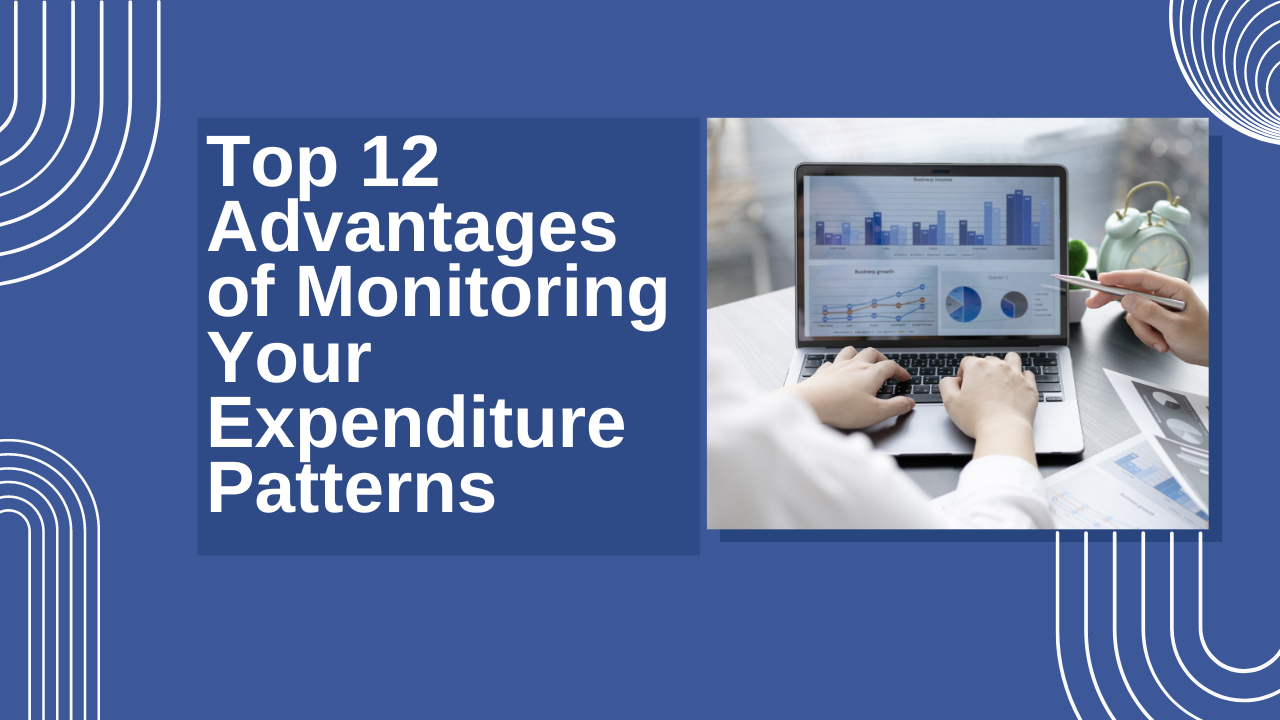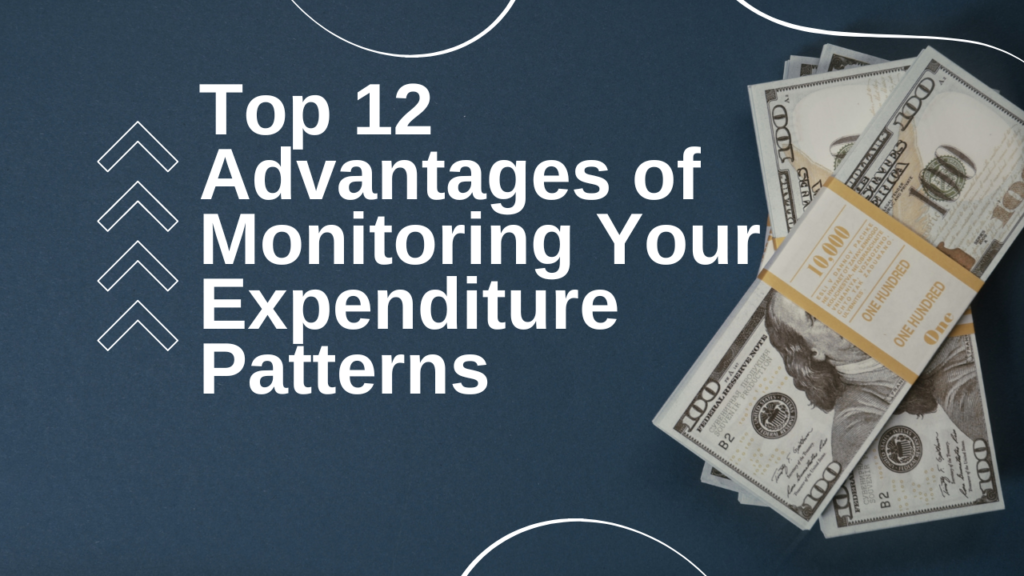Top 12 Advantages of Monitoring Your Expenditure Patterns

Have you ever had the feeling that your money mysteriously vanished? Well, you are not alone. Many of us struggle to understand where our hard-earned money goes each month. However, what if there was a simple way to solve this mystery and regain control of your finances? This is where tracking your spending habits comes into play. It is the key to gaining financial clarity and empowerment. So lets dive into Top 12 Advantages of Monitoring Your Expenditure Patterns.
Table of Contents
ToggleKey takeaways
Financial Clarity: Tracking your spending patterns provides clarity to your finances, revealing where your money goes.
Empowered Budgeting: Precision budgeting becomes possible, assisting with debt management and future savings.
Identifying Overspending: Identify areas of excessive spending so that you can make informed decisions and save more efficiently.
Enhanced Decision-making: Having a clear financial picture allows you to make confident decisions that are aligned with your goals.
Reduced Stress: By taking control of your finances, you can reduce financial stress and improve your overall well-being.
In a world where financial stability is elusive, tracking spending habits emerges as a beacon of hope, allowing people to regain control, make informed decisions, and pave the way for a brighter financial future. Read more such articles on Vantage Vista Blog.
Understanding Financial Control
You receive your paycheck, but as the days pass, it appears that your wallet has a leak, causing your funds to drain without explanation. This is a scenario that many people can identify with. Tracking your spending habits is like becoming a detective to solve the mystery of where your hard-earned money goes.
To identify personal expenditure patterns, you can follow these steps
1. Check Your Accounts: Look at your checking account and credit card history for the last several months to identify your spending patterns.
2. Categorize Your Expenses: Divide your expenses into categories to keep track of how much you spend and where your money goes.
3. Record All Spending: Save your receipts and use a spending tracker to add them up at the end of the week or month, or keep a small notebook on hand to record all of your expenses.
4. Identify the fixed and variable expenses: Fixed expenses, such as mortgage or rent, utilities, insurance, and debt payments, are less likely to fluctuate from month to month. Variable costs such as food, clothing, and travel can be adjusted.
5. Analyze Your Expenses: Examine your expenses to identify areas where costs can be cut, resulting in potential savings.
6. Create a Personal Spending Plan: Make a personal spending plan or budget to help you manage your expenses and set realistic financial goals.
By taking these steps, you can identify your personal spending habits, understand where your money is going, and make informed decisions to achieve your financial goals.
Methods of Tracking Spending Habits
There are several methods for tracking your spending habits:
1. Pen and Paper: The traditional method entails writing down all expenses in a notebook. Simple, effective, and does not require technical knowledge.
2. Spreadsheets: Tools such as Excel and Google Sheets are excellent for tracking spending. You can create categories, enter your expenses, and let the spreadsheet do the work.
3. Mobile Apps: Many budgeting apps, such as Mint, YNAB, or PocketGuard, sync with your accounts, categorize spending, and generate insightful reports.
4. Cash Envelopes: Use envelopes to separate cash into different categories. When an envelope is empty, it means it’s time to cut spending in that category.
5. Review your bank and credit card statements on a regular basis to identify patterns and track spending trends.
Utilizing Available Technology and Tools
There are numerous digital tools and resources available for tracking expenses effectively. These tools allow people to easily track their expenses. Some popular options are:
1. Money Lover: This free app allows you to track your expenses, manage your budget, and set financial goals.
2. Walnut: A personal finance management app that automatically tracks your expenses and provides information about your spending habits.
3. ET Money: This app allows you to track your expenses, invest in mutual funds, and manage your financial portfolio.
4. ClearTax: ClearTax is a web-based tool that tracks your income, expenses, and investments while also offering tax filing services.
5. Expensify: A tool that allows you to track your expenses, generate reports, and automate expense management for businesses.
These are just a few of the many digital tools and resources for tracking expenses. It’s critical to find the one that best suits your needs and preferences.
Top 12 Advantages of Monitoring Your Expenditure Patterns
In today’s fast-paced world, managing finances effectively can feel like juggling coins on a busy street. That’s why tracking your expenses is your secret weapon. In this article, we will explore practical tips and resources to navigate the journey of tracking your spending habits and why it can be a game-changer.
1. Increased financial awareness
The primary benefit of tracking your spending habits is developing a thorough understanding of your financial situation. It’s like turning on a light switch in a dark room; everything becomes clear right away.
2. Precision Budgeting
Tracking your spending allows you to create a budget with surgical precision. You’ll know exactly where every dollar goes, making it easier to stick to your financial objectives. For example, you can budget wisely, pay off debts, and save for future financial goals.
3. Identifying Excessive Spending.
Have you ever wondered where those extra dollars disappear? Tracking your expenses allows you to identify areas of overspending, such as frequent dining out or high-priced clothing purchases. For example, if takeout costs are draining your budget, cooking at home becomes a cost-effective alternative. Tracking your spending habits allows you to identify unnecessary expenses and save more money.
4. Effective Debt Management.
Unchecked spending often leads to debt accumulation. However, by tracking your expenses, you can devise strategies for gradually paying off your debts.
5. Increased Decision-Making Ability
When you have a clear understanding of your financial situation, making decisions becomes easier. Whether it’s a large purchase or a small indulgence, you can make informed decisions that are consistent with your financial objectives.
6. Emergency Preparedness.
Life is unpredictable, and emergencies can occur at any time. Tracking your spending habits aids in the development of an emergency fund, which serves as a financial safety net in the event of unforeseen circumstances.
7. Achievement of Financial Goals.
Aligning your spending habits with your financial objectives allows you to save for specific goals. Whether you want to buy a house, travel the world, or retire early, tracking your spending puts you on the path to achieving your financial goals.
8. Reduced Financial Stress
Money concerns are a major source of stress. Keeping a close eye on your spending gives you control, reduces financial stress, and promotes overall well-being.
9. Building Better Saving Habits
As you observe your spending habits, saving becomes a natural outcome. It progresses from a difficult task to a conscious and rewarding habit.
10. Enhanced Credit Score
Responsible spending improves your credit score. Tracking your financial behavior ensures that you maintain a healthy credit profile, which opens the door to better financial opportunities.
11. Increased Confidence
Financial confidence is empowering. Knowing where your money goes and having a plan gives you a sense of control and confidence in your financial choices.
12. Building Long-Term Wealth
Finally, tracking your spending habits is critical to creating long-term wealth. It lays the groundwork for investments, retirement planning, and a financially secure future.
Open Communication about Finances with Family and Friends
Talking about money with family and friends can help break down cultural barriers. This allows people to seek financial advice and guidance. Maintaining open communication about finances with family and friends can be difficult, but it is critical for developing healthy relationships and avoiding financial misunderstandings. Here are some tips to help you communicate openly about finances with your loved ones:
Start with Yourself: Before you can communicate openly about finances with others, you must first be honest and open with yourself. Take some time to reflect on your own attitudes and behaviors toward money, and be willing to admit areas where you can improve.
Pick the Right Time and Place: Choose a time and location where everyone can concentrate and communicate without interruption. Avoid discussing financial matters in public, especially during times of high stress or conflict.
Be Honest and Transparent: When discussing finances with family and friends, it’s important to be honest and transparent about your own financial situation. Avoid trying to impress others or hiding financial difficulties.
Listen and Empathize: When others share their financial situation, listen actively and try to empathize with their perspective. Avoid being judgmental or dismissive of their concerns.
Establish Boundaries and Expectations: Establish clear financial boundaries and expectations, such as how to split expenses or manage joint accounts. Be prepared to negotiate and compromise when necessary.
Focus on Shared Goals: Finally, when discussing finances with family and friends, keep in mind that everyone has the same dreams and goals. Working together to achieve common goals can help you strengthen relationships and increase your financial success.
Tips for Effectively Tracking Spending Habits
To effectively track your spending habits, consider the following tips:
• Be Consistent: Make tracking a part of your daily routine to ensure accurate results.
• Set realistic goals: Set attainable financial goals and use tracking as a tool to achieve them. This gives the process a purpose.
• Review regularly: Regular reviews avoid surprises and allow for timely adjustments to your budget.
• Involve your partner or family: If applicable, keep track of team spending. It encourages transparency and common financial goals.
• Use Categories Wisely: Create specific categories to better understand your spending habits. Avoid broad categories, which may conceal specific expenses.
Some common mistakes to avoid when tracking expenses include:
Procrastinating on Expense Tracking: Delaying the recording of expenses can lead to disorganization and difficulty in understanding your financial situation.
Failure to Categorize Expenses Properly: Incorrectly categorizing expenses can make it challenging to understand the true profitability of your business or manage personal finances effectively.
Neglecting to Track Small Expenses: Overlooking small expenses can lead to missed opportunities for savings, accurate bookkeeping, and valuable tax deductions.
Not Having a Clear Expense Policy: In a business context, not having a clear expense policy can lead to confusion and ambiguity about eligible expenses and reimbursement procedures.
Failure to set realistic budgeting goals can impede the effectiveness of expense tracking and budget management.
To avoid these mistakes, it is critical to meticulously track all expenses, categorize them correctly, and establish clear expense management policies, whether for personal or business purposes. Furthermore, setting realistic goals and not overlooking minor expenses is critical for effective expense tracking and budget management.
Top 12 Advantages of Monitoring Your Expenditure Patterns Final Thoughts

In a world where many people struggle to find financial stability, tracking spending habits stands out as a beacon of hope. It’s more than just numbers; it’s about regaining control, making deliberate decisions, and ensuring a better future. The advantages go far beyond personal finance, contributing to a society in which individuals are empowered, stress is reduced, and financial well-being becomes a shared goal.

skapa ett binance-konto
Thanks for sharing. I read many of your blog posts, cool, your blog is very good.